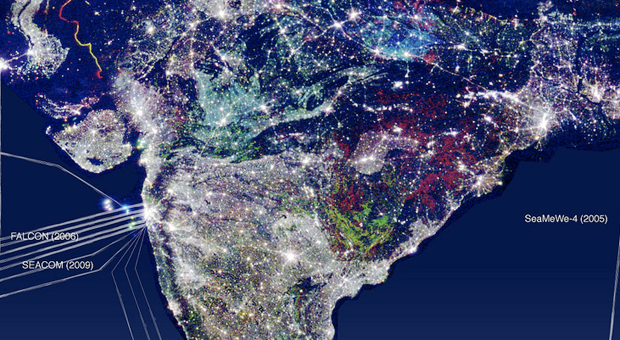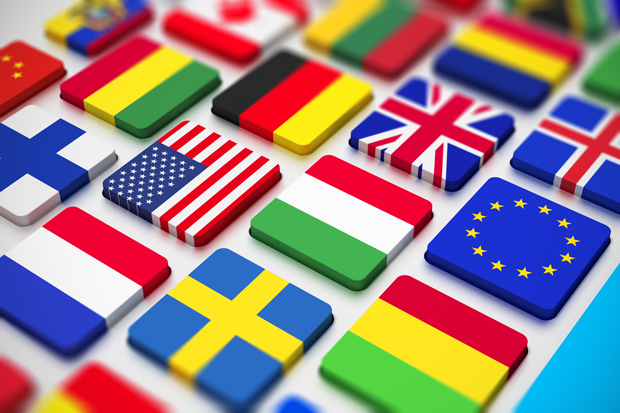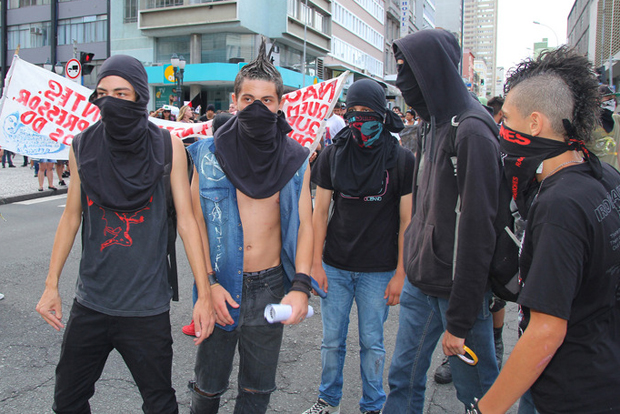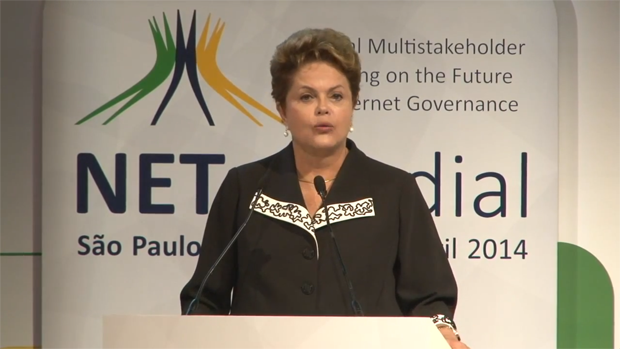1 May 2014 | Digital Freedom, India, News

India was among the few governments that did not sign the NETmundial outcome statement. But why does it seem that the world’s largest democracy is not putting its weight behind a “bottom-up, open, and participatory” multistakeholder process?
In his address to the NETmundial gathering, Vinay Kwatra, the official Indian representative said, “We recognize the important role that various stakeholders play in the cyber domain, and welcome involvement of all legitimate stakeholders in the deliberative and decision making process. Internet is used for transactions of core economic, civil and defence assets at national level and in the process, countries are placing their core national security interests in this medium. Now with such expansive coverage of States’ activities through the internet, the role of the governments in the Internet governance, of course in close collaboration and consultation with other stakeholders is an imperative.”
The message was clear. The internet has a large role to play in India’s national policy goals, and to that end, a global internet governance ecosystem has to be managed, at the international level, by multilateral mechanisms.
India has over 200 million Internet users — with about 52 million subscriptions — over 900 million mobile telephone subscribers. These numbers are only going to grow. Kwatra, continuing his address, added that, “On our part, however, we would have liked to some of important principles and ideas, highlighted by us and many other countries reflected in the draft outcome document… (we) look forward to constructively engaging with other delegations in collectively contribute to making the Internet open, dynamic and secure, and its governance balanced between rights and responsibilities of all its stakeholders.” (sic)
Kwatra was speaking, of course, at NETmundial, dubbed the “world cup of internet governance.” Held in Sao Paolo, Brazil, on April 23-24, 2014, the conference was announced by Brazil President Dilma Rousseff. The entire chain of events can be traced back to the revelations by Edward Snowden that the US’s National Security Agency had been spying on its own citizens and other countries alike, including the personal communication of President Rousseff. In a heated statement at the UN General Assembly in September 2013, she called for the UN to oversee a new global legal system to govern the internet. She said such multilateral mechanisms should guarantee the “freedom of expression, privacy of the individual and respect for human rights” and the “neutrality of the network, guided only by technical and ethical criteria, rendering it inadmissible to restrict it for political, commercial, religious or any other purposes.
Soon, after a brief consultation with Fadi Chehade in October 2013, the head of ICANN — Internet Corporation for Assigned Names and Numbers – an organization thatcoordinates the Internet’s global domain name system, the dates of NETmundial was announced. And to add expectation to the event, in March 2014, the the U.S. Commerce Department’s National Telecommunications and Information Administration (NTIA) announced its intent to transition key internet domain name functions to the global multistakeholder community. It clarified that it would not hand over ICANN to any government-led body. Suddenly, NETmundial gained weight as it was to be the next international forum where the future of internet governance was to be debated – and now one of the organizations government a part of the internet was in play. A far cry from what President Rousseff had suggested in the UN General Assembly, instead of talking about an international legal regime to govern cyberspace, the focus of the meeting turned to multistakeholderism as the way forward in the sphere of internet governance.
The draft outcome statement and the subsequent final outcome state released after the two-day conference is a result of 180 input documents and 1300 comments from over 47 countries, and the work of the 1229 delegates from 97 countries who attended NETmundial. India had an official delegation as well as civil society participants who attended the meeting. In fact, an Indian academic was chosen to co-chair the organizing committee for civil society for the event. Remote participations hubs were set up in cities around the country, including Gurgaon, Chennai and Bangalore. Within the Indian contingent too, as with any large country, there are divergent views on the governance framework to be taken for the internet, with those who support the governments view for multilateralism at the international level and multistakeholderism at home, and those who oppose the official view and encourage an international multistakeholder regime.
The final statement – though non-binding – has squarely put its weight behind multistakeholderism. It talks about protecting the ‘rights that people have offline, must be protected online… in accordance with international human rights legal obligations.’ It also champions cultural and linguist diversity, which was part of India’s official submission to NETmundial. However, when the document starts to tilt towards governance structure is where it diverges from the official Indian position, with language such as – “internet governance institutions and processes should be inclusive and open to all interested stakeholders. Processes, including decision making, should be bottom-up, enabling the full involvement of all stakeholders, in a way that does not disadvantage any category of stakeholder.”
In the crucial area of cyber jurisdiction, it says, ‘It is necessary to strengthen international cooperation on topics such as jurisdiction and law enforcement assistance to promote cybersecurity and prevent cybercrime. Discussions about those frameworks should be held in a multistakeholder manner.’ On surveillance, the most controversial topic from 2013 which prompted the Netmundial meeting in the first place, the document says, ‘Mass and arbitrary surveillance undermines trust in the Internet and trust in the Internet governance ecosystem. Collection and processing of personal data by state and non-state actors should be conducted in accordance with international human rights law. More dialogue is needed on this topic at the international level using forums like the Human Rights Council and IGF aiming to develop a common understanding on all the related aspects.’
The reaction to Netmundial has been varied, depending on whom you ask. There are those who have hailed it as a first positive step towards a multistakeholder process, and are encouraged to find that participants found more things to agree on than disagree. The US called it a “huge success”. The European Commission felt Netmundial put it on the “right track.” Many big businesses released statements indicating they were pleased at the outcome. The civil society group at Netmundial expressed ‘deep disappointment’ that the outcome statement did not address key concerns like surveillance and net neutrality. Others commentators hailed it a big success for big business as it was able to ‘grab the ball on three important points: intellectual property; net neutrality; and intermediary liability’.
In a sense, India’s refusal to sign the outcome statement, and instead take back to its stakeholders seems to be completely aligned with its stated view of the internet. If, as documentation suggests, the internet is being viewed by India as not merely an open, free, global commons that should remain untouched by any major governmental control, but instead a resource that needs to reflect the values of an ‘equinet’ – a platform for commerce, e-governance, national security mechanism to be achieved through fair playing rules established by a ‘globally acceptable legal regime’ and a ‘new cyber jurisprudence’, then there is a long battle ahead. The official Indian argument does not need to be viewed through the lens that presupposes it wishes to inflict censorship in the manner that an authoritarian government might. The argument must be weighed on the merits of this line of thought – that for Indian netizens, business, and even state surveillance to survive, it must be the government who reflects the national interest in international platforms, after having consulted stakeholders back home.
It certainly seems that the weight and development of a billion people sits heavy on the shoulders of the Indian government. The question is: does it need to lead them to the world wide web, or can they find it themselves?
This article was posted on May 1, 2014 at indexoncensorship.org
1 May 2014 | Brazil, Digital Freedom, News, Russia, United States

“ICANN’s mission is stewardship and operational stability, not the defence of its existence or the preservation of the status quo.”
Stuart Lynn, ICANN President, Feb 2002
There has been much debate this month among internet circles about the future of the Internet Corporation for Assigned Names and Numbers (ICANN). Much of this was discussed at the NETmundial meeting in Sao Paolo, a suitable venue given Brazil’s desire to throw its weight behind reforming such bodies as ICANN. Reforms are on the cards, but no one seems to be clear what exactly these will do to the way the internet is used. Sentiments of doom and gloom mix with utopian forecasts of freedom.
The NETmundial Multistakeolder Statement doesn’t reveal much, other than paying lip service to various principles (freedom of expression and association, privacy) and charting the roughest of roadmaps for future directions on Internet governance. Aspiration, be it in terms of transparency, accountability and collaboration, is key.
ICANN was incorporated in California on September 18, 1998. Its creation was heralded as a loosening of the grip by US authorities on the operational side of the Internet, tasking a company to take over administrative duties. ICANN plays a leading role in dealing with the distribution of IP addresses and the management of the Domain Name System (DNS).
As far back as February 2002, the organisation’s president, Stuart Lynn, saw the need for reforms of the body. Reforms had to “replace ICANN’s unstable institutional foundations with an effective public-private ownership, rooted in the private sector but with the active backing and participation of national governments.” Tensions of management are fundamental – keeping an eye on “high-level elements of the Internet’s naming and address allocation systems” while avoiding intrusions that would stifle “creativity and innovation”. That tension has never been resolved.
On Mar 14, the National Telecommunications and Information Administration (NTIA), based in the US Department of Commerce, announced that its grip on ICANN would be loosened. “The timing is right to start the transition process,” claimed Assistant Secretary of Commerce for Communications and Information, Lawrence E. Strickling. “We look forward to ICANN convening stakeholders across the global Internet community to craft an appropriate transition plan.”
John M. Eger, Director of the Creative Economy Initiative at San Diego State University, was enthusiastic. “The US Government’s decision to end oversight of [ICANN] represents an opportunity for US leadership creating global ‘e-government’ systems to solve international law enforcement and terrorism problems, develop global education and environmental initiatives, and in turn, start using the Internet as a platform for advancing a new foreign-policy agenda.”
Eger’s overview is counter-intuitive – to shape internet governance, to seize the day, as it were, in such areas, one has to liberalise such bodies as ICANN and lessen the grip. Technology can be better managed and directed if the big holders release the creation. The Internet can become both a tool of open governance if the Obama administration embraces a “multistakeholder model”. “Letting go of ICANN gives the US momentum to more aggressively breathe life into the thousand[sic] of applications, which more truly internationalise its usefulness to nations, and to the world community.”
Eger’s observations are problematic on one direct level. US leadership in such areas has tended towards bullying and cajoling negotiating partners in accepting a supposedly universal premise in implementing its own specific policies. Nothing demonstrates that more acutely than the current secret Trans-Pacific Partnership Agreement talks. Ostensibly geared to accelerate trade liberalisation, the leaked chapters of the document suggest that Washington is keen to impress strict, even draconian intellectual property provisions on potential signatories. What can’t be done through Congress can be smuggled in via international treaty.
The suggested relinquishing of control by the US Department of Commerce has not been deemed a wise gesture on the part of such individuals as Sweden’s minister for foreign affairs, Carl Bildt. In relinquishing such control, internet governance would be altered, allowing other states to throw their hats in the ring. Bildt is convinced that widening such involvement on ICANN is not “the way to go.”
Bildt’s concern is paternalistic. Opening such doors will let in rather unsavoury characters keen on over-regulation. “Net freedom is as fundamental as freedom of information and freedom of speech in our societies.” Despite extolling such virtues, he has proven rather enthusiastic about dousing the flames over the NSA revelations of blanket surveillance, arguing that the Swedish FRA is, in fact, a defender of online freedoms. Visions of governance tend to vary.
Bildt also chairs the Chatham House and Centre for International Governance and Innovation Inquiry, created to examine the Snowden legacy and state censorship of the Internet. In a statement in January, the inquiry partners emphasised that “a number of authoritarian states are waging a campaign to exert greater state control over critical internet resources.” They are far from the only ones.
The short of it is that governments are compulsive meddlers. As attractive as the rhetoric of liberty and freedom might be, intrusive governance is still regarded as acceptable. The Brazilian Minister of Communications, Paulo Bernardo, considers virtual crimes and cybersecurity as vital areas of government policy. He did concede that “protocol standards and domain names registration can be perfectly controlled by the technical community.”
The language of Nikolai Nikiforov, Russian representative at NETmundial, proved more muscular. “Being subject to international laws, states act as grantors of rights and freedoms for citizens, play a role in the economy, security and stability of internet infrastructure, and undertaken measures to prevent, detect and deter illegal actions in the global network.”
Governments, it seems, just can’t let go.
This article was posted on May 1, 2014 at indexoncensorship.org
30 Apr 2014 | Americas, Brazil

In Curitiba, about 300 protesters took to the streets of the central city asking for more health and safety improvements in the country and against the hosting of the World Cup 2014 in Brazil. (Image: João Frigério / Demotix)
Brazilians shouldn’t protest during the World Cup, according to UEFA President Michel Platini.
Speaking to reporters, the French former footballer who is now head of European football’s governing body, said that: “We must tell the Brazilians that they have the World Cup and they are there to show the beauty of their country and their passion for football. If they can wait at least a month before making social outbursts, it would be good for Brazil and for the football world.”
Brazilians should “pay tribute to this beautiful World Cup,” Platini continued, saying it was given to Brazil to “make them happy”.
He added that Brazilians should get in the mood for receiving tourists from all over the world “and that for one month, they should make a truce”.
The men running football (it is most often men) have a history of making at best misguided, at worst ignorant, statements about complicated issues — FIFA President Sepp Blatter famously suggested racist incidents on the pitch could be settled by a handshake.
However, you would think that the size of last summer’s World Cup-related protests, and the fact that demonstrations are still going on almost a year later, would make even the grandees of world football understand that Brazilians have legitimate grievances — and that these shouldn’t be shoved aside just so we can have a global party.
The various controversies surrounding Brazil 2014, from the price tag of some £7 billion, to lack of transparency and unsafe working conditions at building sites, have been well documented. This is in no small part due Brazilians taking to the streets, making it impossible for their government, FIFA and the rest of the world to ignore their dissatisfaction.
But Platini isn’t the only one who wants protesters to take a break during the very event that for many has been the focus of their anger. Indeed, authorities have taken a number of steps aimed at suppressing demonstrations, including banning people from wearing masks during protests and “promoting ‘tumult’ within 5 km of a sporting event.” The over 170,000 security personnel set to be deployed will probably play their part too.
Whether or not you believe that the intention behind awarding Brazil the World Cup was to make people happy, there’s no escaping that fact that many aren’t. The competition is going ahead, there’s no changing that, but Brazilians should have the right to show their unhappiness about it whenever they like.
This article was published on April 30, 2014 at indexoncensorship.org
30 Apr 2014 | Brazil, Digital Freedom, News, United States

Brazilian President Dilma Rouseff spoke at the opening of NETmundial.
“In 2013, the revelations about the comprehensive mechanisms for spying and monitoring communications provoked outrage and disgust in broad sectors of the Brazilian and the world’s public opinion. Brazilian citizens, companies, embassies and even the President of the Republic had their communications intercepted. Such facts are unacceptable. They undermine the very nature of the Internet: open, pluralistic and free”.
With these words, President Dilma Rousseff opened the NETmundial – Global Multistakeholder Meeting on the Future of Internet Governance, held in São Paulo on April 23 and 24.
Organized by the Brazilian Internet Steering Committee (CGI.br) and /1Net, the unprecedented gathering brought together 1,229 participants from 97 countries. The meeting included representatives of governments, the private sector, civil society, the technical community and academics. Among those present were the Under Secretary-General of the United Nations, Wu Hongbo; the President of ICANN (Internet Corporation for Assigned Names and Numbers), Fadi Chehade; the “father” of the Web, Tim Berners-Lee, and the co-author of TCP/IP and vice-president of Google, Vint Cerfol. The creator of WikiLeaks, Julian Assange, attended the event via Skype.
The words of the president of Brazil seemed to indicate the tone of the meeting: “This reunion responds to a global desire for change in the current situation, with the systematic strengthening of freedom of expression on the internet and the protection of basic human rights, such as the right to privacy”.
In the audience, activists wore masks with the face of Edward Snowden, whose leaks were a catalyst for NETmundial. They protested against the Article 15 of the Marco Civil–signed into law by Rousseff at the event’s opening ceremony–which orders the retention of users’ browsing data. Some demanded that Brazil offer asylum to Snowden.
The main objective of NETmundial was to begin to formulate a system of international internet governance that will come into effect in September 2015, when the United States steps away from the coordination of ICANN, which administers and manages the names and domains used on the internet.
NetMundial was born thanks U.S. spying that targeted the Brazilian government. Rousseff personally stitched together the event after her speech at the UN General Assembly last year that strongly condemned the NSA spying.
After the meeting, a statement of principles was approved. However, the document does not clearly state any principle governing the massive data espionage or violation of privacy. The term “neutrality” appears only in the list of topics to be discussed in the future. The mass surveillance is identified only as a discrediting factor of the net: “Mass and arbitrary surveillance weakens the trust and the confidence in the internet and in the ecosystem of internet governance”, says the document. The collection and use of personal data “should be subject to international human rights law”. And nothing more. Without incrimination, without any preventive or corrective measure, the question remained open. The postponement of the discussion about net neutrality was advocated by the U.S. private sector.
The final document raised much criticism from civil society, which had their expectations disappointed. With a weak text, the Charter of Principles was more like a set of corporate standards, with little affirmative language, full of marketing buzzwords. Its statements are soft. The governments’ voices, especially the U.S.’s, sounded much stronger. Civil society condemned the lack of explicit rules for the “net neutrality” – the term, by the way, was not even mentioned. Another criticized point was the inclusion of protection and copyright of intellectual property, which meets to the interests of lobbyists from business environment and is contrary to the recommendations of collaborative and free creation.
“The document ended up not reflecting the greatness of the debate that happened here. We missed the chance to produce a substantial document to the discussion of the internet governance”, said Laura Tresca, from the NGO Article 19. “The positive balance is in the process, which was interesting: we experienced the idea of the multistakeholder model in practice; but the final document was too weak.”
EFF published a text that defined the outcome of the meeting as “disappointing”.
The multistakeholder model was criticized by activists as “oppressive, determined by political and market interests”. People like Jérémie Zimmermann (La Quadrature Du Net, which defends the rights and freedom of citizens on the web) and Jacob Appelbaum (developer and security researcher) said that the principles of NetMundial were “empty of content and devoid of real power”. These activists argue that governments have an obligation to ensure the rights of users and that the internet is a common, free and geared to citizens’ good.
It would be very difficult to have unanimity with so many sectors present. Russia, Cuba and India disagreed with the Charter of Principles. Brazil’s minister of communications, Paulo Bernardo, missed a more forceful condemnation of espionage. “For obvious reasons, the United States was uncomfortable with it”, said Bernardo. He recognized that the document is not perfect, but evaluates that it means a victory for the future of governance. The idea now is to enhance the text in other debates, such as the Internet Governance Forum (IGF), that will be held next September in Turkey and in Brazil in 2015.
NETmundial was a historic step putting Brazil in the frontline for internet use in the world, even with the disagreements and a questionable model. Nevertheless, it lacked the courage to allow the voice of the people to sound louder than economic interests. To push the most important issues into the future for further discussions was a mistake – both strategic and purposeful. In this sense, they have bitten more than they could chew.
A previous version of this article referred to Wu Hungbo as the Secretary-General of the United Nations. His correct title is Under Secretary-General of the United Nations. This has now been corrected.
This article was published on April 30, 2014 at indexoncensorship.org




